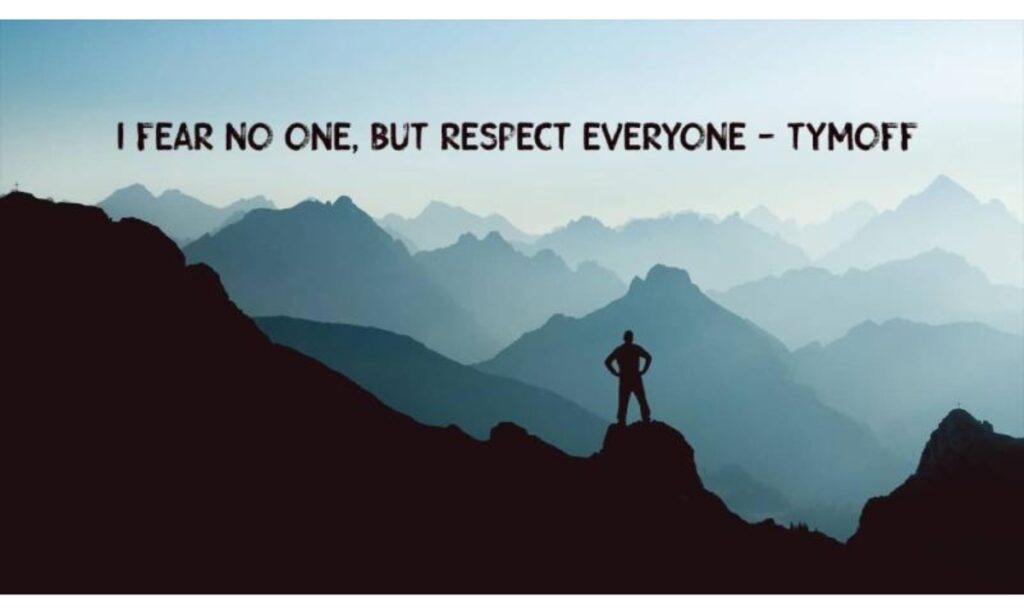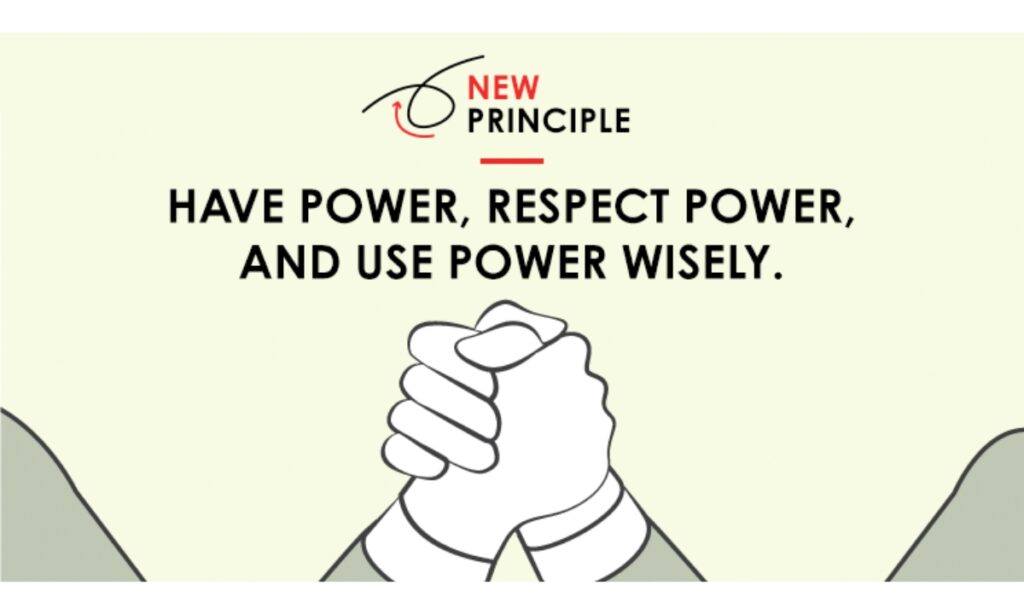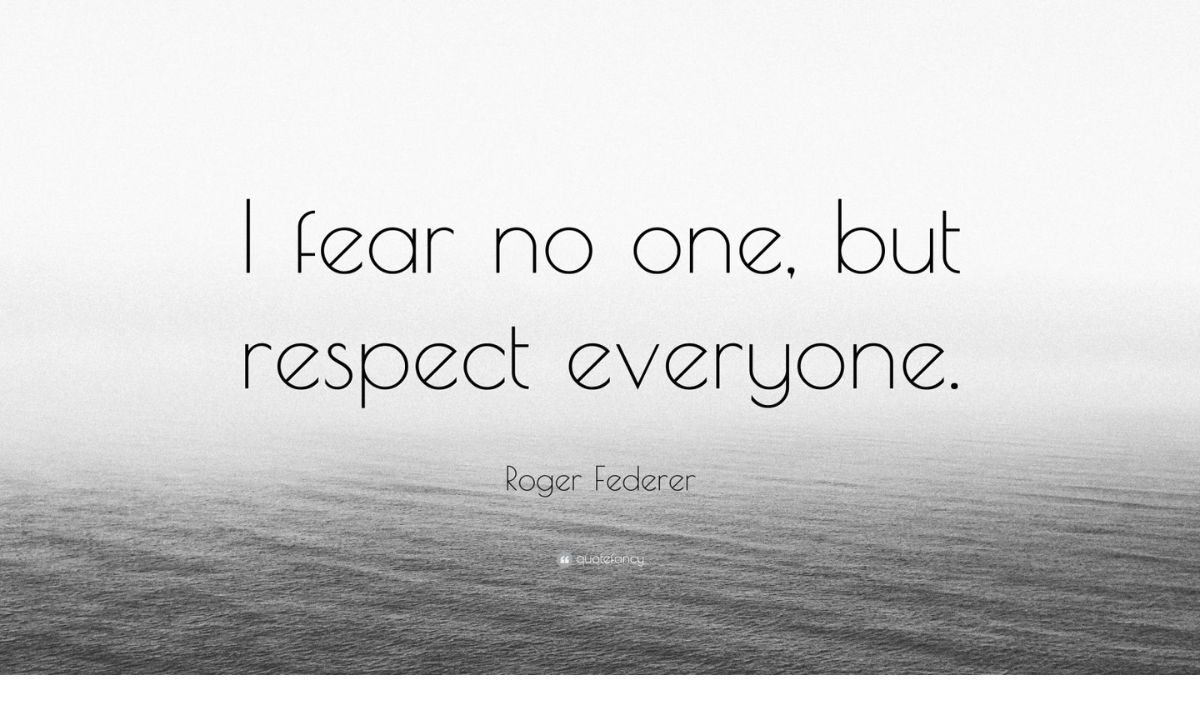In a world often driven by fear and lacking in respect, Tymoff’s powerful words ring out like a clarion call: “I fear no one, but respect everyone.”
This simple yet profound statement encapsulates a transformative philosophy that has the potential to reshape our relationships, our communities, and even our global society.
But what does it truly mean to live without fear while maintaining respect for all? Let’s dive deep into this balanced approach to life and explore how it can lead to personal growth and societal impact.
The Essence of Fearlessness
Fearlessness, as Tymoff suggests, isn’t about reckless bravado or a complete absence of caution. Instead, it’s about cultivating inner strength and self-confidence that allows us to face life’s challenges head-on. True fearlessness stems from a deep understanding of oneself and a willingness to confront our vulnerabilities.
Consider these aspects of fearlessness:
- Courage: The ability to act despite feeling afraid
- Resilience: Bouncing back from setbacks and failures
- Self-assurance: Trusting in one’s abilities and judgment
- Authenticity: Being true to oneself regardless of others’ opinions
Historically, fearless leaders have shaped the course of nations and inspired millions. Take, for example, Nelson Mandela, who faced 27 years of imprisonment yet emerged without bitterness, leading South Africa towards reconciliation. His fearlessness in the face of adversity exemplifies Tymoff’s philosophy.
Understanding Tymoff’s Perspective

While we don’t have extensive biographical information about Tymoff, their words offer a window into a profound worldview. The phrase “I fear no one, but respect everyone” likely emerged from a combination of life experiences and deep reflection.
It suggests a journey from perhaps fearing others or seeking their approval to a place of inner strength coupled with genuine regard for all individuals.
Tymoff’s perspective resonates particularly strongly in today’s American society, where fear often dominates public discourse and respect seems in short supply. By embracing this philosophy, we can work towards a more harmonious and productive society.
Courage to Embrace Vulnerability
At the heart of Tymoff’s fearlessness lies a willingness to embrace vulnerability. This might seem counterintuitive – after all, isn’t vulnerability a weakness? On the contrary, acknowledging our vulnerabilities is a sign of true strength and self-awareness.
Dr. Brené Brown, a renowned researcher on vulnerability, offers this insight:
“Vulnerability is not winning or losing; it’s having the courage to show up and be seen when we have no control over the outcome.”
By facing our fears and insecurities head-on, we can:
- Develop authentic relationships
- Foster innovation and creativity
- Build resilience in the face of failure
- Enhance emotional intelligence
- Cultivate empathy for others
Embracing vulnerability doesn’t mean exposing every aspect of ourselves indiscriminately. Rather, it’s about having the courage to be our authentic selves, flaws and all.
The Power of Respect

The second half of Tymoff’s quote – “but respect everyone” – is equally crucial. Respect, in this context, isn’t about fear-based deference or blind admiration. It’s about recognizing the inherent worth and dignity of every individual, regardless of their status, beliefs, or background.
Here’s how genuine respect manifests:
- Listening actively and attentively
- Valuing diverse perspectives
- Treating others with kindness and courtesy
- Acknowledging the contributions of others
- Honoring boundaries and personal space
In American culture, respect often intersects with concepts of individual rights and freedoms. By cultivating respect for all, we create a society where these rights are upheld and cherished.
Fearlessness and Respect: A Delicate Balance
Tymoff’s philosophy hinges on the delicate balance between fearlessness and respect. These two concepts, far from being mutually exclusive, actually reinforce each other.
Fearlessness without respect can lead to arrogance and disregard for others, while respect without fearlessness might result in passivity or an inability to stand up for oneself.
Consider this table illustrating the interplay between fearlessness and respect:
| Fearlessness | Respect | Outcome |
| High | High | Confident, compassionate leadership |
| High | Low | Arrogance, disregard for others |
| Low | High | Passivity, inability to assert oneself |
| Low | Low | Insecurity, potential for conflict |
Leaders who embody both fearlessness and respect often achieve remarkable results. Take for example Malala Yousafzai, who fearlessly advocates for girls’ education while maintaining respect for diverse cultures and traditions.
Building Stronger Relationships

Applying Tymoff’s philosophy can dramatically improve our interpersonal connections. By approaching relationships with fearlessness, we open ourselves up to deeper, more authentic connections. Simultaneously, showing respect to everyone we encounter fosters trust and mutual understanding.
Here are some practical ways to apply this mindset in your relationships:
- Practice active listening: Give your full attention to others without interrupting or planning your response.
- Express yourself honestly: Share your thoughts and feelings without fear of judgment.
- Set healthy boundaries: Respect yourself enough to establish limits, and respect others’ boundaries in return.
- Embrace diversity: Seek out and value perspectives different from your own.
- Offer sincere appreciation: Regularly acknowledge the positive qualities and contributions of others.
By consistently applying these principles, we can create a ripple effect of positive change in our personal and professional spheres.
Benefits of Balancing Fearlessness and Respect
The transformative power of Tymoff’s approach extends far beyond improved relationships. Embracing this philosophy can lead to significant personal growth and self-improvement. Some key benefits include:
- Enhanced self-confidence: By facing our fears, we build trust in our own abilities.
- Improved communication skills: Fearless respect fosters open, honest dialogue.
- Greater resilience: Fearlessness helps us bounce back from setbacks more easily.
- Expanded perspective: Respecting diverse viewpoints broadens our understanding of the world.
- Increased creativity: A fearless mindset encourages innovative thinking and risk-taking.
These benefits compound over time, leading to a more fulfilling and successful life journey.
The Impact on Society
Imagine a society where Tymoff’s philosophy was widely embraced. The potential for positive change is enormous. In the United States, where political polarization often hinders progress, a culture of fearless respect could transform public discourse.
Some potential societal impacts include:
- Reduced conflict: Mutual respect can de-escalate tensions and promote understanding.
- Increased civic engagement: Fearlessness encourages active participation in community and political processes.
- Enhanced problem-solving: Diverse perspectives, respected and fearlessly expressed, lead to more innovative solutions.
- Improved mental health: A society built on respect and courage can reduce stress and promote well-being.
Education plays a crucial role in promoting these values. By incorporating lessons on fearlessness and respect into school curricula, we can nurture a generation of confident, compassionate citizens.
The Journey Within: Cultivating Fearlessness and Respect

Embracing Tymoff’s philosophy is a lifelong journey of self-discovery and growth. Here are some strategies to help cultivate fearlessness and respect in your own life:
- Practice mindfulness: Regular meditation can help you confront your fears and develop inner strength.
- Challenge yourself: Step out of your comfort zone regularly to build courage.
- Learn about diverse cultures: Expanding your knowledge fosters respect for different perspectives.
- Volunteer: Serving others can deepen your respect for humanity and boost your confidence.
- Seek feedback: Ask trusted friends or mentors for honest input on your interactions with others.
Remember, progress isn’t always linear. Be patient with yourself as you work towards embodying these principles.
Conclusion
Tymoff’s words, “I fear no one, but respect everyone,” offer a powerful framework for personal growth and societal change. By cultivating fearlessness, we unlock our true potential and face life’s challenges with courage. By maintaining respect for all, we create a more harmonious world where diversity is celebrated and every individual is valued.
As we navigate an increasingly complex and interconnected world, this balanced approach becomes more crucial than ever. It’s not always easy – fear and disrespect often seem like easier paths. But by committing to this philosophy, we can transform our lives and our communities.
So, let’s take Tymoff’s words to heart. Let’s face our fears, embrace our vulnerabilities, and extend respect to everyone we encounter. In doing so, we might just create the kind of world we all wish to live in – one marked by courage, compassion, and mutual understanding.
Also Read this Blog: Who is Melyssa Davies? Age, Career, Family, Net Worth, Height Bio 2024

Taylor Swift is the founder and lead writer behind the independent blog genrealpro.com










